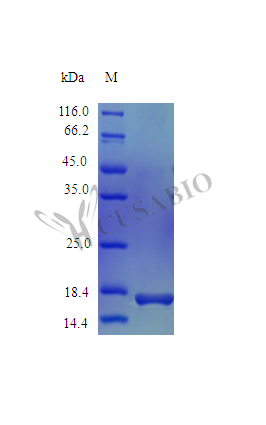Recombinant Mouse Interleukin-33 protein (Il33) is expressed in E. coli and represents a partial segment (109-266 amino acids) of the full protein. This tag-free protein is purified to over 98% as confirmed by SDS-PAGE analysis. It appears to be biologically active, with an ED50 of less than 0.5 ng/ml, demonstrating a specific activity greater than 2.0 × 10^6 IU/mg in a cell proliferation assay using murine D10S cells. The endotoxin level is maintained below 1.0 EU/µg, as verified by the LAL method.
Interleukin-33 (IL-33) is a cytokine belonging to the IL-1 family, recognized for its role in immune response regulation. It acts as an alarmin—released when cells get damaged or stressed—and helps activate immune cells, including T helper type 2 cells and mast cells. This protein may prove crucial for studying inflammatory conditions and immune system modulation, making it particularly relevant in immunological research and therapeutic exploration.
Potential Applications
Note: The applications listed below are based on what we know about this protein's biological functions, published research, and experience from experts in the field. However, we haven't fully tested all of these applications ourselves yet. We'd recommend running some preliminary tests first to make sure they work for your specific research goals.
1. Cell Proliferation and Activation Assays
This recombinant mouse IL-33 protein is confirmed to be highly biologically active (ED₅₀ < 0.5 ng/ml in murine D10S cells) and suitable for stimulating various IL-33-responsive immune cells, including Th2 cells, mast cells, and basophils. The exceptional potency and high purity (>98%) ensure reliable dose-response studies in both primary immune cells and established cell lines. Researchers can confidently use this protein to investigate IL-33-mediated cellular responses, including cytokine production and phenotypic changes, with minimal concern for endotoxin interference.
2. Cytokine Signaling Pathway Studies
The biologically active IL-33 is appropriate for detailed investigation of the IL-33/ST2 signaling pathway in mouse systems. The demonstrated high potency validates its capacity to engage receptors and activate downstream signaling cascades involving MyD88, IRAK, and NF-κB pathways. Researchers can reliably use this protein for phosphorylation studies and mechanistic investigations of IL-33-mediated immune responses in preclinical models.
3. Antibody Development and Validation
This high-purity, tag-free IL-33 serves as an excellent immunogen for antibody development. The expression of the full mature protein (109-266aa) provides complete epitope coverage, and the confirmed biological activity ensures antibodies will recognize functional conformations. The protein is suitable for ELISA development, Western blot validation, and generating function-blocking antibodies for research applications.
4. Protein-Protein Interaction Studies
The biologically active IL-33 is well-suited for studying interactions with the ST2 receptor and other binding partners. The tag-free design and high purity ensure accurate binding measurements in SPR, BLI, or other interaction assays. The demonstrated bioactivity confirms proper folding for authentic receptor engagement, making interaction data biologically relevant.
5. In Vitro Disease Model Development
This IL-33 protein is ideal for establishing inflammatory and allergic response models in vitro. The high specific activity (>2.0×10⁶ IU/mg) and low endotoxin content enable creation of well-controlled experimental systems that specifically probe IL-33-mediated pathophysiology. Researchers can use this protein to screen therapeutic compounds or study disease mechanisms with confidence in its biological specificity.
Final Recommendation & Action Plan
This E. coli-expressed mouse IL-33 is an exceptional research reagent with validated high potency and purity, making it suitable for all proposed applications. For immediate use, employ it at low concentrations (starting from sub-nanogram levels) in proliferation and signaling studies, leveraging its high specific activity for precise dose-response experiments. The confirmed activity in murine cells indicates proper folding despite E. coli expression, though researchers should note the potential absence of post-translational modifications that may affect some biological functions. For antibody development, this protein is ideal for generating high-quality reagents due to its complete epitope coverage. When developing disease models, use the established ED₅₀ as a reference point for creating pathophysiologically relevant IL-33 concentrations. For all applications, include proper controls and consider that the extreme potency may require careful dilution schemes to avoid over-stimulation in sensitive assays.






